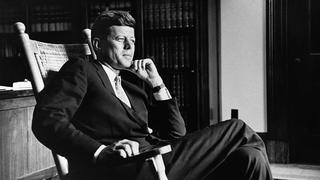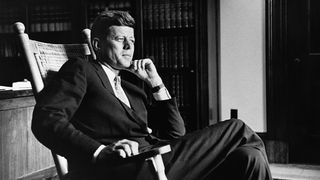John Fitzgerald Kennedy’s words continue to resonate on the centenary of his birth.
“For a world of complex and continuing problems, in a world full of frustrations and irritations, America’s leadership must be guided by the lights of learning and reason — or else those who confuse rhetoric with reality and the plausible with the possible will gain the popular ascendancy with their seemingly swift and simple solutions to every world problem.”
These words define and distil the essence necessary for US leadership in the world and of the dangers in the occupant of the Oval Office abandoning this critical role or succumbing to the easy responses inherent in populism.

Tragically, Kennedy never delivered the speech from which these words were taken. It was an address scheduled to be made in Dallas on November 22, 1963.
Nonetheless, these words constitute a valuable reminder of how JFK — who initially had begun a presidential campaign in 1956 with few goals but ambition born of his father, ambassador Joseph Kennedy Sr — came to understand the significance of the US presidency in global affairs.
It was a hard school, with crisis and confrontation the staple fare of the times.
Kennedy began, by his own admission, poorly. The Bay of Pigs fiasco in April 1961, in which Cuban expatriate invaders of Fidel Castro’s Cuba were routed, may have been inherited from the preceding Eisenhower administration, but it was the new president who wore the outrage. His critics were legion, damning Kennedy as lacking in the leadership skills vital in the White House.
Partly as a consequence, the Soviets misjudged the calibre of the young president. The Vienna summit with Soviet premier Nikita Khrushchev in June 1961 was marked by Russian belligerence and threats, especially over West Berlin, an enclave of democratic life surrounded by the Soviet satellite, the (East) German Democratic Republic.
This Soviet misjudgment led directly to the 13 days of the Cuban missile crisis of October 1962. But Kennedy had learned from earlier experience, demonstrating real caution and being extraordinarily restrained as Soviet nuclear missiles were identified in Cuba.
One story explains the presidential determination not to be driven to a military response by way of invasions or airstrikes as recommended by Pentagon advisers. In April that year, from the cruiser USS Northampton, JFK had watched the US Atlantic Fleet pass in review off the Virginian coast. As this panoply of naval might passed before the commander-in-chief, he asked himself what he was supposed to do with all this devastating hardware. Suddenly the answer came to him: nothing. The existence of the Atlantic Fleet, with its unquestioned capability, was sufficient of itself. The deterrent was real and overwhelmingly powerful.
So the Cuban missile crisis, which did take the world to the edge of nuclear war, was resolved with a naval blockade and a negotiated exit, guaranteeing Castro there would be no new US invasion.
Now Americans invest the Oval Office with majesty as well as power. Not for nothing is the presidential anthem Hail to the Chief. But beyond American shores, US allies tend to confer the pivotal leadership role for global strategy on the occupant of 1600 Pennsylvania Avenue.
This has been true of global affairs since Harry Truman began constructing the Pax Americana, combining American alliances and the guarantee of the US nuclear umbrella, after World War II. This leadership role is now in doubt.
Kennedy’s words again resonate. From his Pulitzer prize-winning Profiles in Courage, for which due acknowledgment must be afforded long-time speech writer Theodore C. Sorensen, American obligations emerge clearly: “A nation which has forgotten the quality of courage which in the past has been brought to public life is not as likely to insist upon or reward that quality in its chosen leaders today — and in fact we have forgotten.”
The expression of courage in leadership need not only be found in military strength. Words are an inalienable means of projecting and defending values and there is no better place than Berlin to remember Kennedy’s contribution.
In the shadow of the Berlin Wall in June 1963, flanked by German chancellor Konrad Adenauer and West Berlin mayor Willy Brandt, JFK famously identified the West and himself as intrinsically linked to the isolated West Berliners.
His challenge to the Soviet tyranny was emphatically asserted: “All free men, wherever they may live, are citizens of Berlin …”. No accident, then, that president Ronald Reagan returned to that defiance two decades later, with the rhetorical challenge in virtually an identical place, declaring: “Mr Gorbachev, tear down this wall.”
And no surprises, either, that senator Barack Obama spoke in 2008 in a unified Berlin, with the backdrop of the thoroughfare of the Brandenburg Gate, during his presidential campaign. Kennedy led, “mobilising the English language and sending it into battle”, as he once described Winston Churchill. The president sought to shape history. Other presidents, beginning with Lyndon Johnson, were pleased to follow.
And a perhaps surprising element in JFK’s leadership, sometimes overlooked, is the simple fact he promised far less to Americans than he asked of them. This is at the core of his inaugural address. It dominates his acceptance speech at the Democratic national convention in July 1960 in Los Angeles that came to be characterised as the New Frontier: “The New Frontier of which I speak is not a set of promises — it is a set of challenges. It sums up not what I intend to offer the American people but what I intend to ask of them.”
It’s not necessary to eulogise Kennedy for what he was not, and his flaws were manifold. But he was a global leader, from the creation of the Peace Corps to civil rights advocacy. His leadership inspired a 16-year-old Bill Clinton, meeting the president in the White House, to pursue a career in public office.
As the commitment and leadership of an America led by Donald Trump — in the wake of recent disengagement from the Paris climate change framework, and reticence to reaffirm article 5 of the NATO treaty — comes more and more to be questioned, the qualities of the Kennedy presidency, all too tragically cut short, are not only worth commemorating and celebrating but also renewing.






